ERP systems have become an integral part of modern business. They help to improve the efficiency of all processes and increase transparency. Using modern ERP systems, companies can monitor all operations and prevent possible risks. The ERP market is growing rapidly and attracting new users. According to research, the total market size is expected to reach USD 147.7 billion in 2025. This fact demonstrates the importance of an ERP system in the modern business world.
A correctly selected ERP system is a key success factor for any company. It not only helps businesses to become more flexible but also to adapt quickly to constantly changing customer preferences and market conditions. The right ERP system provides many benefits, such as increased data security, scalability, cost savings, real-time reporting, improved customer service, and many more that we will cover in detail later.
New ERP systems regularly appear on the market the most popular today are Odoo, SAP, 1C, Microsoft Dynamics 365, and others. In this article, we will compare Odoo vs new ERP 2025, consider all the details, trace the importance of a correctly selected ERP for business, and help you find the best ERP for small businesses in 2025 and beyond.
Key Criteria for ERP Evaluation
Every day, businesses are more actively using ERP systems. This is an information system that allows storing and processing of huge amounts of critical data. Before we move directly to the criteria for ERP evaluation, it is worth noting that regardless of the developer, all these systems have a common architecture: platform, database, and modules. Choosing a perfect ERP system for business is very important and quite difficult. In order to simplify this process, we will look at the most important criteria for ERP evaluation below, and then it will be easier to compare Odoo vs modern ERP systems.

Functionality & Features
Today, the ERP market offers a huge number of solutions with a diverse range of functions, and ERP system features comparison is crucial. However, in order for operations to run smoothly, the system needs the following set of functions:
- financial management
- project management
- production management
- sales and order management
- customer relationship management
- logistics management
- automation
- risk control
- quality control
These are the main functions that ensure the successful organization of processes. Remember that there may be many more, as ERP systems are usually flexible and allow the integration of different tools for specific business tasks.
Ease of Use & Implementation
The implementation of an ERP system is a demanding task; however, it brings many benefits and significantly increases a company’s profits. Implementation of any ERP system consists of several stages and requires readiness not only of management but also of personnel, because new functions will appear in every part of the company.
As for the direct use of an ERP system, it is crucial that its interface is user-friendly and easy to understand, so that the personnel can get used to the new system, and in the future, using the ERP will be a positive experience.
Scalability & Customization
Any business that achieves success continues to move on and grow. Therefore, when selecting an ERP system, attention is paid to the system’s scalability and its ability to easily adapt to your processes. ERP customization and flexibility guarantee alignment with your current needs and future growth opportunities.
Pricing & Total Cost of Ownership (TCO)
Pricing and TCO are important factors when selecting an ERP system, and they depend on your requirements and needs. For example, you can check Odoo pricing versus their competitors. As for the total cost, there are many factors involved, including:
- installation
- configuration (i.e., adapting the system to your requirements)
- licence-fee
- costs for the internal IT team
- training costs
- data hosting
- internal servers
- cloud servers
- cloud-managed infrastructure
Integration Capabilities
Ideally, the selected ERP should easily integrate with existing applications and software. If not, the situation may lead to complications in operations or the inability to solve complex problems. In order to avoid such problems, business operations should be analyzed and clear tasks defined for the ERP to perform.
Support & Community
Most businesses encounter minor difficulties immediately after implementing an ERP and therefore need technical support. It is crucial that the developer provides this support, helps you deal with possible problems, answers your questions, and makes sure that your business functions are operating correctly. It is also great if you are given an opportunity to be part of a community where you can share your experiences and get valuable advice from your colleagues.
A perfectly chosen ERP solution will be a key factor in the success of the business. The ideal solution should adapt quickly to current business logistics and future demand, have a well-designed payment system, and not overload users with outdated features.
Odoo: Strengths & Weaknesses
Odoo ERP is a suite of fully integrated, open-source applications that can address the workflow automation needs of any business, regardless of its size. The main goal of Odoo is to consolidate business process automation solutions without unnecessary complexity. If we go deeper, we can say that Odoo organizes continuous data flows between business applications, provides business processes transparency, and helps to increase employee productivity. In this part of the article, we will highlight Odoo ERP pros and cons, so that it will be easier for you to decide.
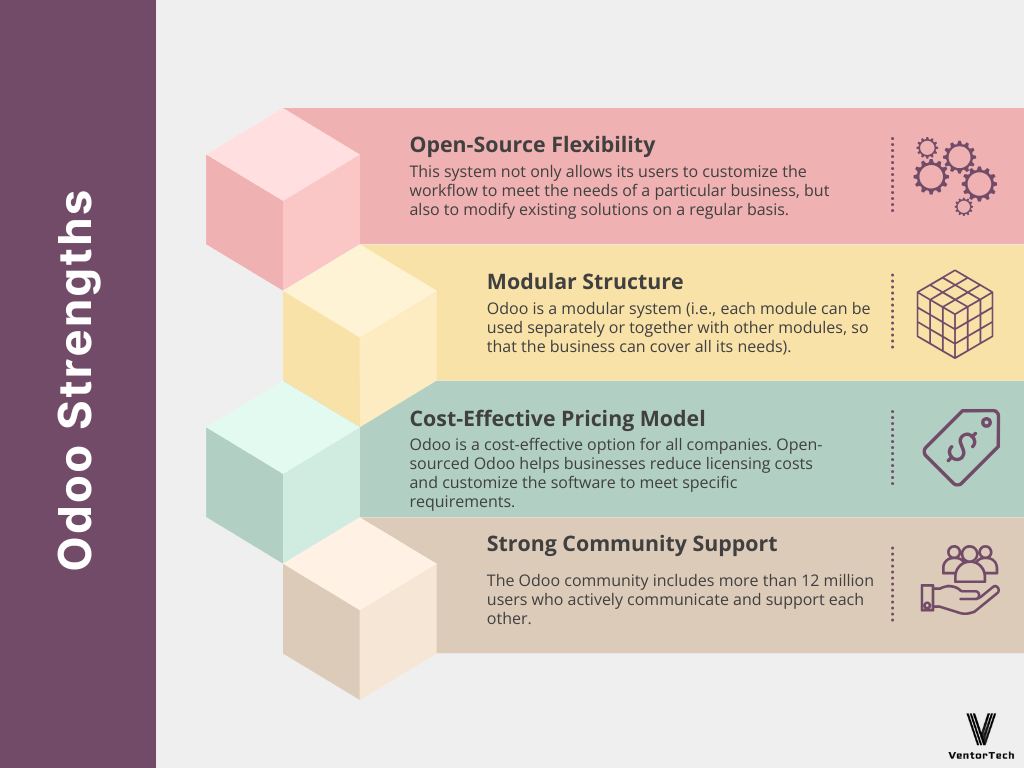
Open-Source Flexibility
Open source is one of the most important advantages, as it opens up huge opportunities. Software developers with whom the company co-operates can make any changes that a particular business requires quite easily and quickly. Such flexibility is a distinctive feature that sets Odoo apart. This system not only allows its users to customize the workflow to meet the needs of a particular business, but also to modify existing solutions on a regular basis. Thus, Odoo is a unique solution that is suitable for businesses of any size and purpose.
Modular Structure
Odoo is a modular system (i.e., each module can be used separately or together with other modules, so that the business can cover all its needs). In this system, each module is responsible for a specific segment of a business, such as warehouse, purchasing, accounting, and so on. Thus, the business can control all processes and make informed decisions. If choosing between modular ERP versus all-in-one ERP, many companies prefer the first option.
Cost-Effective Pricing Model
Odoo is a cost-effective option for all companies, especially those whose needs change regularly. Open-sourced Odoo helps businesses reduce licensing costs and customize the software to meet specific requirements.
Strong Community Support
The Odoo community includes more than 12 million users who actively communicate and support each other. There, you can find the answers to your questions and get valuable advice. In addition, the community can help you solve some problems based on their experience.
Complexity for Beginners
This is one of the few disadvantages of Odoo, which is a complex and rich system with many tools for working with different lines of business. Beginners who are just starting to work with Odoo may encounter some difficulties and find it hard to get used to the system. That is why many businesses work with Odoo partner companies that not only provide full system setup but also provide employee training and support throughout the process.
Need for Customization and Third-Party Integrations
Odoo brings many benefits to businesses of any size. However, it is important to realize that this system is quite difficult to launch without the support of an implementation partner, especially if you have not done it before. Many people see this as a disadvantage, but some customers like the fact that they don’t have to personally spend time setting it up to get positive results right away.
Customization is an important aspect of Odoo, as the system is complex and consists of many modules. You should have a clear understanding of your business needs in order to customize the necessary processes.
Want to experience the benefits of Odoo? Contact us to learn how to get the most out of it!
Emerging ERP Solutions in 2025
We are witnessing rapid growth in the ERP market, which is constantly offering new, cool solutions to make business management easier. Below, we will present to you the most popular new ERP solutions and features in our 2025 review.
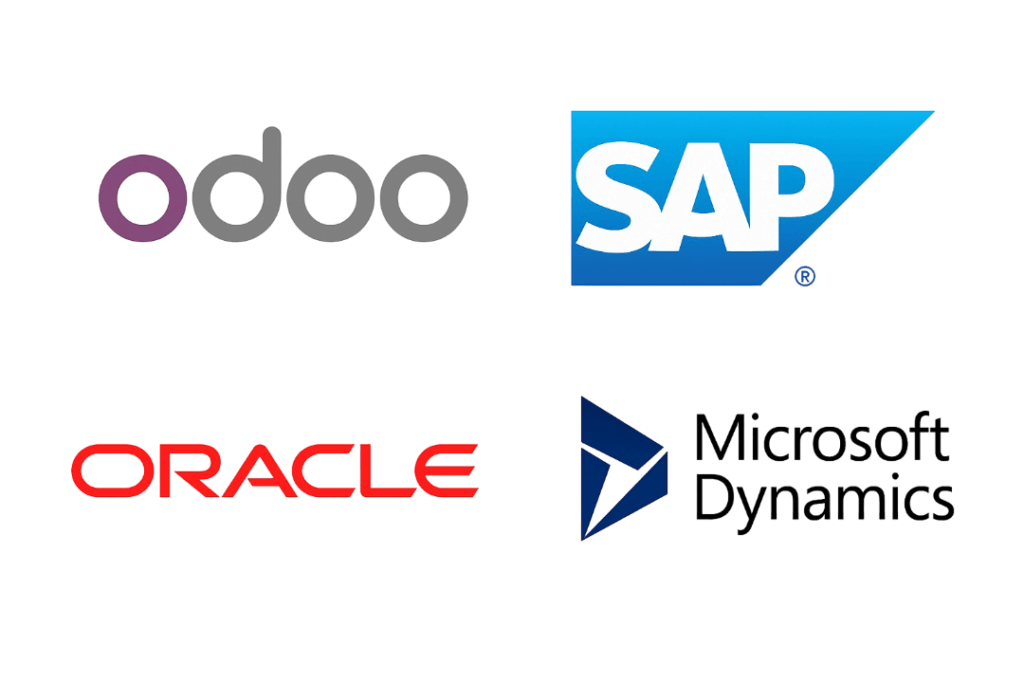
SAP ERP
SAP ERP is a comprehensive software system that optimizes processes, increases productivity, and provides real-time analytical information. The main functional areas of this ERP include sales, accounting and finance, human resource management, supply chain management, CRM solutions, and sourcing and procurement.
SAP is actively implementing innovative AI-based solutions that help companies become more adaptive and deliver real results. An AI assistant from SAP, Joule, will be equipped with several autonomous AI collaborative agents and is expected to help businesses significantly improve efficiency.
Oracle ERP
Oracle ERP is a cloud-based system that consists of interdependent modular solutions. It is an excellent ERP for business automation and processes optimization. The key feature of this system is that, in addition to tools, Oracle ERP includes CRM, HR, EPM, SCM, and MFG modules.
Innovation in Oracle ERP is mainly based on machine learning and helps companies to implement new business models and increase profits. For example, intelligent automation of labor-intensive tasks saves time and allows employees to focus their resources on more strategically important tasks.
Microsoft Dynamics 365
Microsoft Dynamics 365 is a set of intelligent business applications that deliver high-quality operational efficiency and superior customer service. This system enables companies to become more agile and accelerate the delivery of desired results. This system is considered to be the brain of modern technology, and it is designed to help significantly reduce costs, optimize resources utilization, and change the way of doing business.
Microsoft Dynamics 365 is actively utilizing AI-based tools and helping companies to improve efficiency and productivity.
Best ERP 2025 Comparison
Choosing an ERP system involves considering different options, comparing them, and choosing the most suitable one. Below, we will present a comparative analysis of Odoo versus modern ERP systems, and we hope that this will help you make your decision.
Odoo vs SAP 2025
Odoo is an open-source ERP that offers many modules that can be used both together and separately. This way, if comparing Odoo open-source ERP versus proprietary ERP, Odoo ERP offers great options for customization. Speaking of Odoo’s scalability versus that of its competitors, Odoo offers great opportunities for businesses, especially small- and medium-sized ones, that are looking to grow and expect their ERP to grow with them.
Odoo’s interface is user-friendly and flexible, which influences the amount of time and effort spent on task completions. These are significant reasons why customers like this system.
SAP ERP is a great modern solution that also provides many advantages for modern businesses. One of the key advantages of SAP ERP is that it provides accurate, real-time data on all company departments. In addition, the system is designed to accommodate future scalability.
Both of these systems are worthy choices, and both are excellent ERP for business automation. In this case, the choice will depend on the business needs. For example, Odoo’s modular features provide better flexibility and customization, while SAP’s structured approach is well-suited to larger organizations.
Odoo vs Oracle ERP
One of the most important aspects when choosing an ERP system is the financial part. Odoo ERP is an economic solution that allows businesses of all sizes to access quality services at a reasonable price. If comparing Odoo versus cloud ERP in 2025, Odoo is suitable for the cloud, Mac, Windows, and is compatible with Android and iOS. Oracle ERP is compatible only with the cloud, and this aspect should definitely be considered while deciding on what will work best for you. Additionally, Oracle ERP is available in English only, while Odoo offers English, German, Italian, Chinese, Japanese, Russian, and other languages.
In terms of functionality, Odoo ERP offers a comprehensive suite of applications, from financial management to sales. Oracle ERP provides a huge range of advanced functions for managing business processes.
If we are talking about scalability, Oracle ERP provides a bit more when it comes to tools and technologies that scale a database. On the other hand, Odoo ERP is highly customizable, whereas Oracle ERP is hard to customize.
Both of these software programs are good options in their own way and have some advantages and disadvantages. It is essential to realize that they are ideal for different purposes. This is why it is crucial to decide exactly what your business needs an ERP system for before making a choice.
Odoo vs Microsoft Dynamics 365
Both of these platforms have their strongest capabilities in the ERP world, but each is unique in its own way. Each of these software systems meets a different business need, and to better understand them, you need to look at their benefits in more detail.
Odoo stands out for its modular and open architecture, and this opens up unlimited customization and scalability possibilities for companies. In addition, you can pay for only the modules that are relevant to your business. Odoo is an ERP that integrates seamlessly with third-party applications and tools, making it much easier for you to customize your workflow.
Microsoft Dynamics 365 is an integrated set of applications that combines CRM and ERP opportunities in one platform, which is a great option for companies that are already using Microsoft products, such as Office 365. Microsoft Dynamics 365 integrates quickly and easily with other Microsoft products. In addition, it allows users to manage tasks from any device, so it is a great fit for companies with a mobile workforce.
The choice between these two ERP systems depends largely on your business needs overall and the need for customization. If you are looking for a flexible system that can be easily customized and scaled with minimal costs, and is cost-effective in general, then Odoo is the best option.
If, however, you need a comprehensive, integrated ERP system that will support and integrate easily with Microsoft tools, you should opt for Microsoft Dynamics 365. Although this ERP requires a larger initial investment, it offers decent functionality that you won’t regret.
Real-World Use Cases
Many companies continue to choose Odoo from what the ERP market offers in 2025. This particular system contains all the necessary tools to manage and optimize almost all business processes. Odoo development is supported by a huge community that has already released more than 53,000 modules, both free and paid, so any business will find what it needs here. Below, we have gathered the most popular companies that are enjoying their Odoo experience in 2025.
Toyota Material Handling
Toyota is a world-famous car manufacturer, and it is one of the largest companies that use Odoo ERP. The company’s subsidiary, Toyota Material Handling, uses Odoo to manage its European supply and distribution network.
Before implementing Odoo, this company used several ERP systems, but they did not live up to expectations. It was Odoo ERP that helped to automate many workflows and unify dozens of departments. The company emphasizes that Odoo has brought positive results, improved procurement, and enhanced account management.
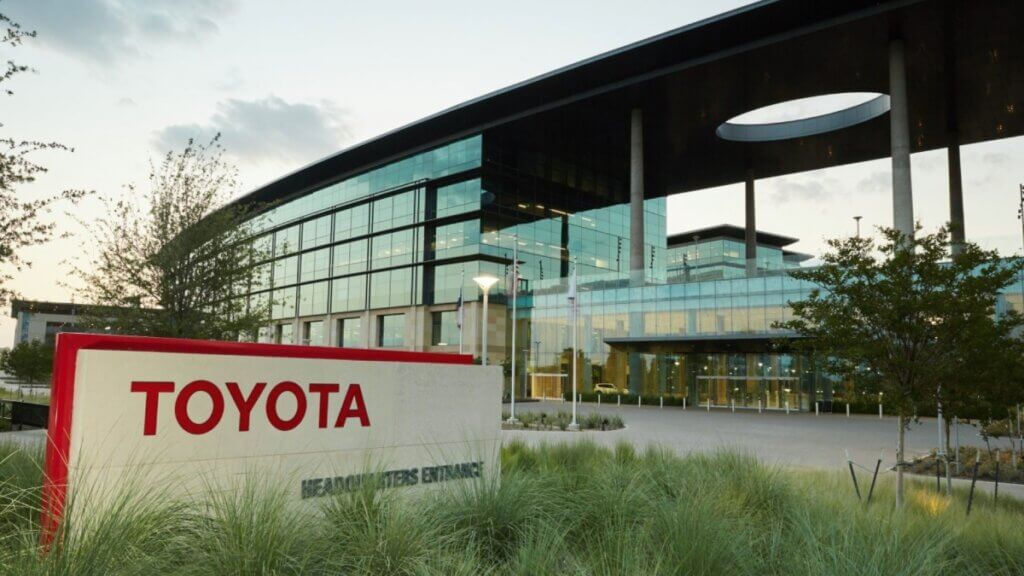
The World Wide Fund for Nature (WWF)
This is a company that grows and maintains trees in the Virunga National Park in the Democratic Republic of Congo. For some time, the company had been looking for an easy-to-use but functional ERP system. Odoo ERP has become an excellent choice for this fund, as the platform’s implementation costs are quite low, and at the same time, it is possible to easily create and integrate the required modules.
With Odoo ERP, WWF now monitors and manages more than 4 million square meters of eucalyptus plantations, while reducing time spent on reporting and control.
Allnex
This company is a world-renowned manufacturer of coatings and paints for various purposes, whether industrial, automotive, or architectural. This company operates 33 production facilities, 23 research and technology support centers, and cooperates with more than 100 countries around the world.
Allnex chose Odoo ERP out of all the offerings in the market because this ERP could fulfill almost all its needs, including CRM, inventory management, procurement, e-commerce, and many other purposes. Allnex installed 8 modules in each of 10 stores, and now Odoo is streamlining their business processes, simplifying data management, minimizing manual tasks, and increasing employee productivity.
Become another success story with Odoo. Contact us to start your project today!
Conclusion & Recommendations
Enterprise resource planning trends in 2025 are developing and changing, but ERP remains a unique opportunity for any business to unite all processes in one convenient system while significantly saving time and resources. Modern ERP systems help companies solve a number of problems, such as increasing business processes efficiency by automating operations, building an effective model of interaction with partners, and forming a unified, company-wide information environment.
AI-driven ERP solutions in 2025 are constantly emerging and improving business management. Artificial Intelligence and machine learning tools are great assistants in creating a perfect platform that will suit all the company’s needs. We are witnessing competition between cloud-based ERP and on-premise solutions, so it is crucial to opt for the best one.
Choosing the right ERP system and customizing it to meet the needs of your business are the key success factors. The customization and flexibility of a chosen ERP system allow businesses to increase efficiency and optimize processes. A correctly selected ERP system will become a reliable tool for business management and will contribute to the company’s development.
When choosing the ideal ERP system for your business, you should consider a huge number of factors, from user-friendly interface characteristics to the number of supported company processes and functionality. By no means hesitate to compare different platforms, for example, Odoo versus the latest ERP solutions, because only in this way can you fully see the whole picture and make an informed decision that you will not regret in the future. Start by checking out what fits best in your own 2025 ERP software market analysis and take a huge step toward running a profitable and scalable business!
Recommended articles:
- Total costs of ownership (TCO) for any ERP system
- Odoo Enterprise License Pricing and How to Reduce Cost
- How to install Odoo on your server using Odoo install script
- Odoo Implementation Steps
- Harnessing the Power of Automation with Odoo ERP
----------------------------------------------------------------------
Education: Bachelor's degree.
----------------------------------------------------------------------
Experience:
Marketing manager
VentorTech
----------------------------------------------------------------------
Current position: Marketing manager VentorTech
----------------------------------------------------------------------
B2B Marketing
Google Tag Manager and GA

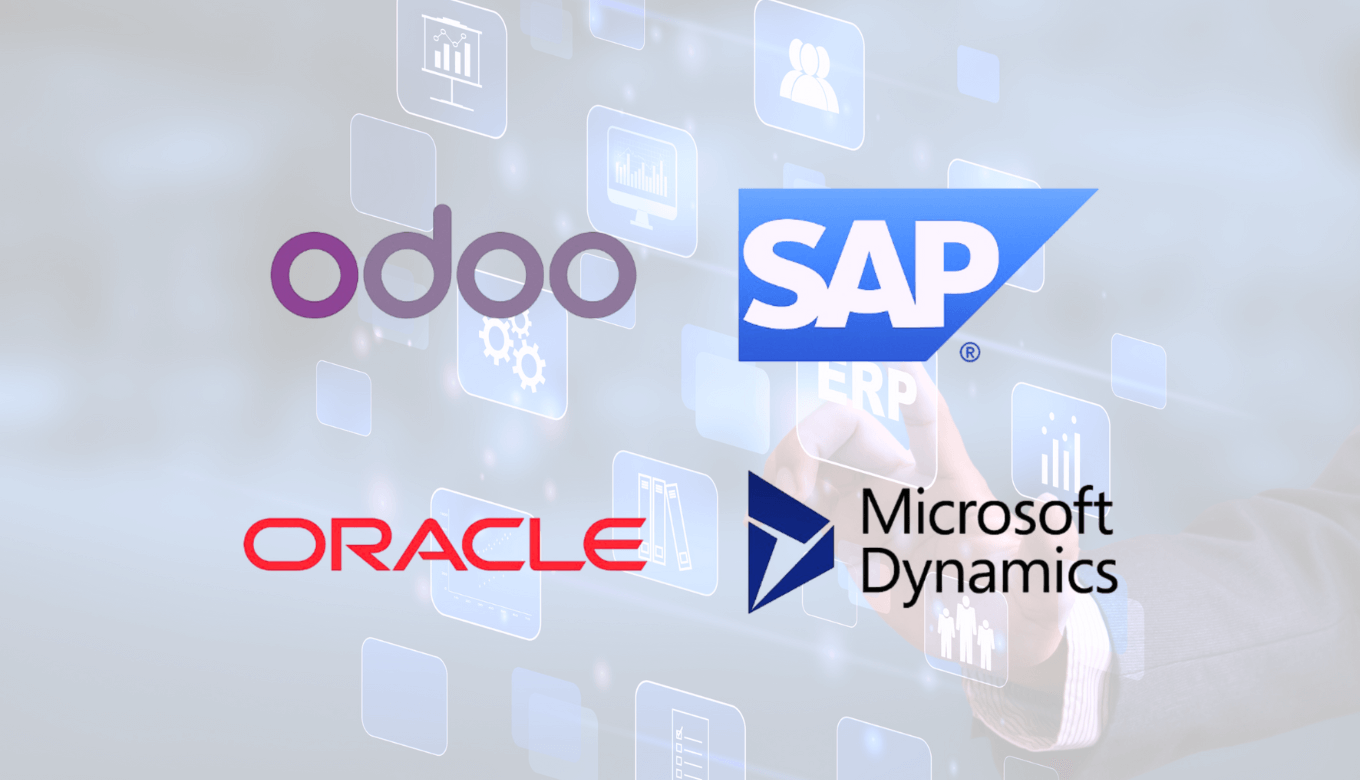

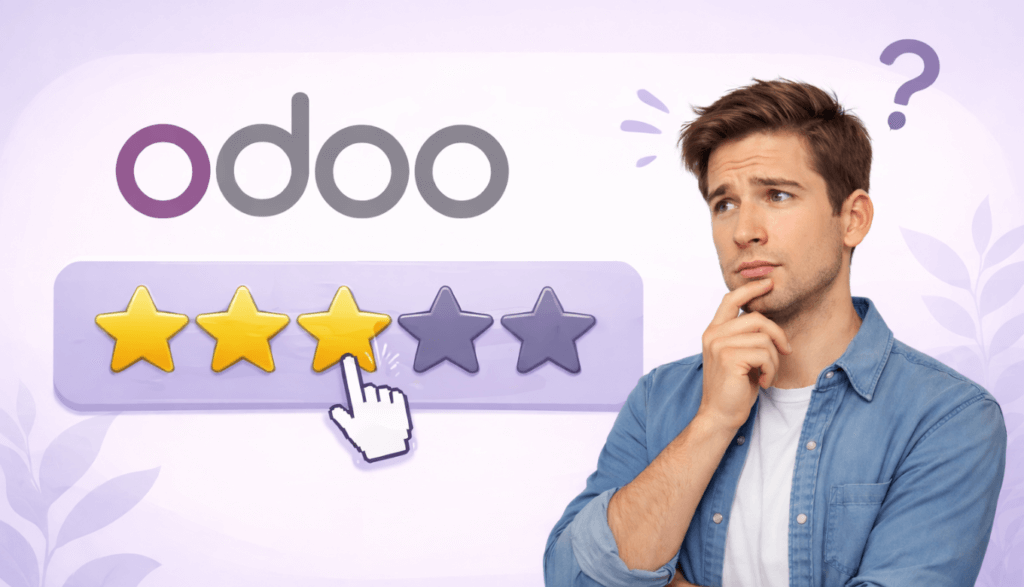
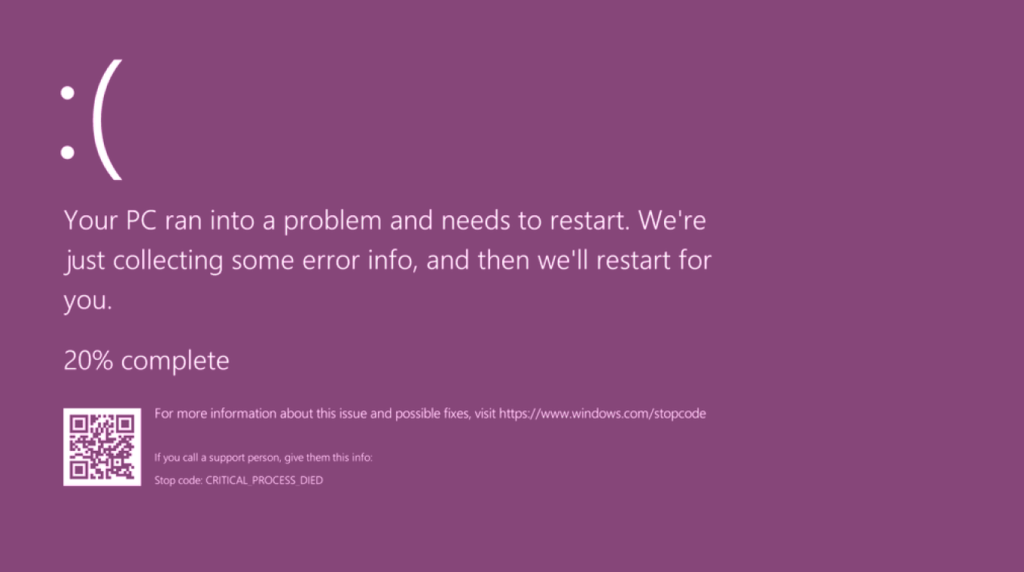

0 Comments